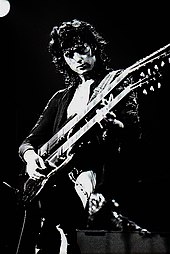From the visit to Bron-Yr-Aur in 1970, the songwriting partnership between Page and Plant became predominant, with Page supplying the music, largely via his acoustic guitar, and Plant emerging as the band's chief lyricist. Jones and Bonham then added to the material, in rehearsal or in the studio, as a song was developed. In the later stages of the band's career, Page took a back seat in composition and Jones became increasingly important in producing music, often composed on the keyboard. Plant would then add lyrics before Page and Bonham developed their parts.
Early lyrics drew on the band's blues and folk roots, often mixing lyrical fragments from different songs. Many of the band's songs dealt with themes of romance, unrequited love and sexual conquest, which were common in rock, pop and blues music. Some of their lyrics, especially those derived from the blues, have been interpreted as misogynistic. Particularly on Led Zeppelin III, they incorporated elements of mythology and mysticism into their music, which largely grew out of Plant's interest in legends and history. These elements were often taken to reflect Page's interest in the occult, which resulted in accusations that the recordings contained subliminal satanic messages, some of which were said to be contained in backmasking; these claims were generally dismissed by the band and music critics.[ The pastoral fantasies in Plant's songwriting were inspired by the landscape of the Black Country region and J. R. R. Tolkien high fantasy novel The Lord of the Rings. Susan Fast argues that as Plant emerged as the band's main lyricist, the songs more obviously reflected his alignment with the West Coast counterculture of the 1960s. In the later part of the band's career Plant's lyrics became more autobiographical, and less optimistic, drawing on his own experiences and circumstances.

Niciun comentariu:
Trimiteți un comentariu